 Jesus gives sight to a man blind from birth and uses the miracle to enlighten us on His law based on love. This is a drastically different perspective and reality than the Old Testament way, Moses’ way, based on law. This incorrect judgment is why He was sent into the world. To detect these sins of judgment, the basic sin of judging others, is really what blindness to the New Testament of Love is all about.
Jesus gives sight to a man blind from birth and uses the miracle to enlighten us on His law based on love. This is a drastically different perspective and reality than the Old Testament way, Moses’ way, based on law. This incorrect judgment is why He was sent into the world. To detect these sins of judgment, the basic sin of judging others, is really what blindness to the New Testament of Love is all about.
Interesting, as the parable plays out there is division among the Pharisees as to how to interpret this situation. Some said “This man is not from God, for he does not keep the Sabbath. Give glory to God! We ourselves know that this man is a sinner.”
Others said ‘How can a man who is a sinner work these signs?” Not all Pharisees were bad, some were good too. I try to avoid the sin of all-or-nothing thinking and judgmentalism but it is difficult, especially in the heat of the moment, in the heat of a competitive situation.
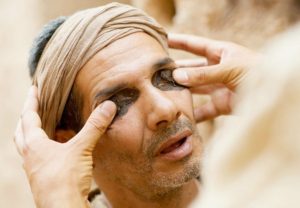 This parable goes even deeper with the man of age whose sight has come to him for the first time challenging the Pharisees directly.
This parable goes even deeper with the man of age whose sight has come to him for the first time challenging the Pharisees directly.
Man with sight being questioned a second time: “I have told you already, and you have heard. Why would you hear again? Would you also become his disciples?”
Pharisees: “Thou art his disciple, but we are disciples of Moses. We know that God spoke to Moses; but as for this man, we do not know where he is from.”
Man with sight: “Why, herein is the marvel, that you do not know where he is from, and yet he opened my eyes. Not we know that God does not hear sinners; but if anyone is a worshipper of God, and does his will, him he hears. Not from the beginning of the world has it been heard that anyone opened the eyes of a man born blind. If this man were not from God, he could do nothing.”
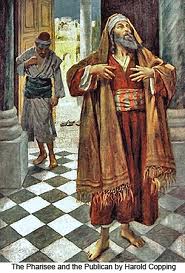 Pharisees: “Thou wast altogether born in sins, and thou dost teach us?
Pharisees: “Thou wast altogether born in sins, and thou dost teach us?
A bit of pride setting in there to justify and rationalize the denial of the Pharisees.
Why, herein is the marvel, I love that phrase!
No different than judge me rightfully as my employer by the work I do and the results and not on the color of my skin, my sex, or anything else that superficially makes me different that you.
There is also a little white lie being told by the parents that Jesus lets slide. They knew who cured their son but pretended not to in fear of the Pharisees. So they were cute in their testimony, or lack of testimony, to the Pharisees.
Parents: “We know that this is our son, and that he was born blind; but how he now sees we do not know, or who opened his eyes we ourselves do not know. Ask him; he is of age, let him speak for himself.”
Pharisees: “Are we also blind?”
Jesus to the Pharisees: “If you were blind you would not have sin. But now that you say, ‘We see,’ your sin remains.
We are all blinded by sin at times. That is why abstinence, in whatever form or format is needed, in needed to stop letting our ego impersonate our soul.
In the next chapter, Jesus uses the parable of the sheepfold to declare himself the Good Shepherd of us believers. Although he tells the Pharisees, they do not believe him, that he is the Son of God, that He and the Father are one.
Jesus: “Amen, amen, I say to you, he who enters not by the door into the sheepfold, but climbs up another way, is a thief and a robber. But he who enters by the door is the shepherd of the sheep. To this man the gatekeeper opens, and the sheep hear his voice, and he calls his own sheep by name and leads them forth. And when he has let out his own sheep, he goes before them; and the sheep follow him because they know his voice. But a stranger they will not follow, but will flee from him, because they do not know the voice of strangers.”
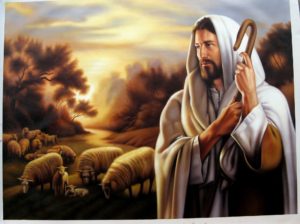 Jesus again: “Amen, amen, I say to you. I am the door of the sheep. All whoever have come are thieves and robbers; but the sheep have not heard them. I am the door. If anyone enter by me he shall be safe, and shall go in and out, and shall find pastures. The thief comes only to steal, and slay, and destroy. I came that they may have life, and have it more abundantly.”
Jesus again: “Amen, amen, I say to you. I am the door of the sheep. All whoever have come are thieves and robbers; but the sheep have not heard them. I am the door. If anyone enter by me he shall be safe, and shall go in and out, and shall find pastures. The thief comes only to steal, and slay, and destroy. I came that they may have life, and have it more abundantly.”
Jesus: “I am the good shepherd. The good shepherd lays down his life for the sheep. But the hireling, who is not a shepherd, whose own the sheep are not, sees the wolf coming and leaves the sheep and flees. And the wolf snatches and scatters the sheep; but the hireling flees because he is a hireling, and has no concern for the sheep.
Jesus again: “I am the good shepherd, and I know mine and mine know me, even as the Father knows me and I know the Father; and I lay down my life for my sheep. And other sheep I have that are not of this fold. Them also I bring, and they shall bear my voice, and there shall be one fold and one shepherd. For this reason the Father loves me, because I lay down my life that I may take it up again. No one takes it from me, but I lay it down myself. I have the power to lay it down, and I have the power to take it up again. Such is the command I have received from the Father.”
Jews: “How long dost thou keep us in suspense? If thou art the Christ, tell us openly.”
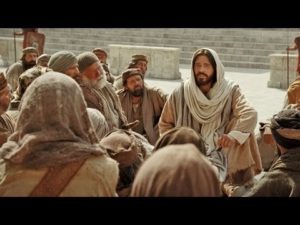 Jesus: “I tell you and you do not believe. The works that I do in the name of my Father, these bear witness concerning me. But you do not believe because you are not my sheep. My sheep hear my voice, and I know them, and they follow me. And I give them everlasting life: and they shall never perish, neither shall anyone snatch them out of my hand. What my Father has given me is greater than all, and no one is able to snatch anything out of the hand of the Father. I and the Father are one.”
Jesus: “I tell you and you do not believe. The works that I do in the name of my Father, these bear witness concerning me. But you do not believe because you are not my sheep. My sheep hear my voice, and I know them, and they follow me. And I give them everlasting life: and they shall never perish, neither shall anyone snatch them out of my hand. What my Father has given me is greater than all, and no one is able to snatch anything out of the hand of the Father. I and the Father are one.”
Jesus: “Many good works I have shown you from my Father. For which of these works do you stone me?”
Jews: “Not for a good work do we stone thee, but for blasphemy, and because thou, being a man, makest thyself God.”
Jesus: Is it not written in your Law, ‘I said you are gods’? If he called them gods to whom the word of God was addressed (and the Scripture cannot be broken), do you say of him whom the Father has made holy and sent into the world, ‘Thou blasphemest,’ because I said, ‘I am the Son of God’? If I do not perform the works of my Father, do not believe in me. But if I do perform them, and if you are not willing to believe me, believe the works, that you may know and believe that the Father is in me and I in the Father.”
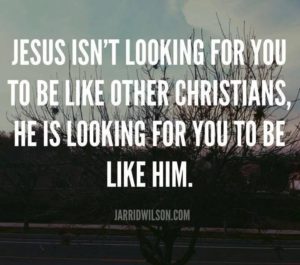 They sought therefore to seize him; and he went forth out of their hands.
They sought therefore to seize him; and he went forth out of their hands.
Jews beyond the Jordan: “John (the Baptist) indeed worked no sign. All things, however, that John said of this man were true.” And many believed in him.
Can we see beyond our own ego impersonating our own soul?
Are we blind or do we see the Son of God in Ourselves and in Jesus?

Day 94: Reading The Bible with a TROML Perspective; Are we blind or do we see the Son of God in Ourselves and in Jesus?
Read and inspired by the New Testament, The Gospel of Saint John Chapters 9 & 10.
Bible Notes:
The Holy Gospel of Jesus Christ according to Saint John
Saint John, the disciple and Apostle whom Jesus loved, was the brother of James and the son of the fisherman Zebedee and Salome.
First a disciple of John the Baptist, he was called to follow Christ.
The purpose of his Gospel he states as follows: “these are written that you may believe the Jesus is the Christ, the Son of God: and that believing you may have life in his name.”
John Chapter 9: Christ questioned about the blind man; Cure of the blind man; He describes his cure; The Pharisees learn of the cure; The blind man’s parents are questioned; The Pharisees again question the cured man; He professes his faith; Jesus accuses the Pharisees.
Disciples: “Rabbi, who has sinned, this man or his parents, that he should be born blind?
Jesus: “Neither has this man sinned, nor his parents, but the works of God were to be made manifest in him. I must do the works of him that sent me while it is day; night is coming, when no one can work. As long as I am in the world I am the light of the world.”
Jesus to the blind man: “Go wash in the pool of Siloe.”
So he went away, and washed, and returned seeing.
Neighbors: “Is not this he who used to sit and beg? It is he. By no means, he only resembles him.”
Yet the blind man declared, “I am he.”
Neighbors: “How were your eyes open?”
Man with sight: The man who is called Jesus made clay and anointed my eyes, and he said to me, ‘Go to the pool of Siloe and wash.’ And I went and washed, and I see.”
Therefore some of the Pharisees said, “This man is not from God, for he does not keep the Sabbath.”
But others said: ‘How can a man who is a sinner work these signs?”
And there was division among them.
Pharisees to the man with sight: “What dost thou say of him who opened thy eyes?
But he said: “He is a prophet.”
Parents: “We know that this is our son, and that he was born blind; but how he now sees we do not know, or who opened his eyes we ourselves do not know. Ask him; he is of age, let him speak for himself.”
These things his parents said because they feared the Jews
Pharisees to man with sight: “Give glory to God! We ourselves know that this man is a sinner.”
Man with sight: “Whether he is a sinner I do not know. One thing I do know, that whereas I was blind, now I see.”
Pharisees: “What did he do to thee? How did he open thy eyes?”
Man with sight: “I have told you already, and you have heard. Why would you hear again? Would you also become his disciples?”
Pharisees: “Thou art his disciple, but we are disciples of Moses. We know that God spoke to Moses; but as for this man, we do not know where he is from.”
Man with sight: “Why, herein is the marvel, that you do not know where he is from, and yet he opened my eyes. Not we know that God does not hear sinners; but if anyone is a worshipper of God, and does his will, him he hears. Not from the beginning of the world has it been heard that anyone opened the eyes of a man born blind. If this man were not from God, he could do nothing.”
Pharisees: “Thou wast altogether born in sins, and thou dost teach us?
Jesus to man with sight: “Dost thou believe in the Son of God?”
Man with sight: “Who is he, Lord, that I may believe in him?”
Jesus to man with sight: “Thou has both seen him, and he it is who speaks with thee.”
Man with sight: “I believe, Lord.” And falling down, he worshipped him.
Jesus to the Pharisees: “For judgment have I come into this world, that they who so not see may see, and they who see may become blind.”
Pharisees: “Are we also blind?”
Jesus to the Pharisees: “If you were blind you would not have sin. But now that you say, ‘We see,’ your sin remains.
John Chapter 10: The parable of the sheepfold; Christ explains the parable; Parable of the good shepherd; Dissension among the Jews; Jesus claims to be Christ; The Jews wish to stone him; Jesus’ defense; Jesus in Perea.
Jesus: “Amen, amen, I say to you, he who enters not by the door into the sheepfold, but climbs up another way, is a thief and a robber. But he who enters by the door is the shepherd of the sheep. To this man the gatekeeper opens, and the sheep hear his voice, and he calls his own sheep by name and leads them forth. And when he has let out his own sheep, he goes before them; and the sheep follow him because they know his voice. But a stranger they will not follow, but will flee from him, because they do not know the voice of strangers.”
Jesus again: “Amen, amen, I say to you. I am the door of the sheep. All whoever have come are thieves and robbers; but the sheep have not heard them. I am the door. If anyone enter by me he shall be safe, and shall go in and out, and shall find pastures. The thief comes only to steal, and slay, and destroy. I came that they may have life, and have it more abundantly.”
Jesus: “I am the good shepherd. The good shepherd lays down his life for the sheep. But the hireling, who is not a shepherd, whose own the sheep are not, sees the wolf coming and leaves the sheep and flees. And the wolf snatches and scatters the sheep; but the hireling flees because he is a hireling, and has no concern for the sheep.
“I am the good shepherd, and I know mine and mine know me, even as the Father knows me and I know the Father; and I lay down my life for my sheep. And other sheep I have that are not of this fold. Them also I bring, and they shall bear my voice, and there shall be one fold and one shepherd. For this reason the Father loves me, because I lay down my life that I may take it up again. No one takes it from me, but I lay it down myself. I have the power to lay it down, and I have the power to take it up again. Such is the command I have received from the Father.”
Division among the Jews: “He has a devil and is mad. Why do you listen to him? versus “These are not the words of one who has a devil. Can a devil open the eyes of the blind?”
Jews: “How long dost thou keep us in suspense? If thou art the Christ, tell us openly.”
Jesus: “I tell you and you do not believe. The works that I do in the name of my Father, these bear witness concerning me. But you do not believe because you are not my sheep. My sheep hear my voice, and I know them, and they follow me. And I give them everlasting life: and they shall never perish, neither shall anyone snatch them out of my hand. What my Father has given me is greater than all, and no one is able to snatch anything out of the hand of the Father. I and the Father are one.”
Jesus: “Many good works I have shown you from my Father. For which of these works do you stone me?”
Jews: “Not for a good work do we stone thee, but for blasphemy, and because thou, being a man, makest thyself God.”
Jesus: Is it not written in your Law, ‘I said you are gods’? If he called them gods to whom the word of God was addressed (and the Scripture cannot be broken), do you say of him whom the Father has made holy and sent into the world, ‘Thou blasphemest,’ because I said, ‘I am the Son of God’? If I do not perform the works of my Father, do not believe in me. But if I do perform them, and if you are not willing to believe me, believe the works, that you may know and believe that the Father is in me and I in the Father.”
They sought therefore to seize him; and he went forth out of their hands.
Jews beyond the Jordan: “John (the Baptist) indeed worked no sign. All things, however, that John said of this man were true.” And many believed in him.

Speak Your Mind